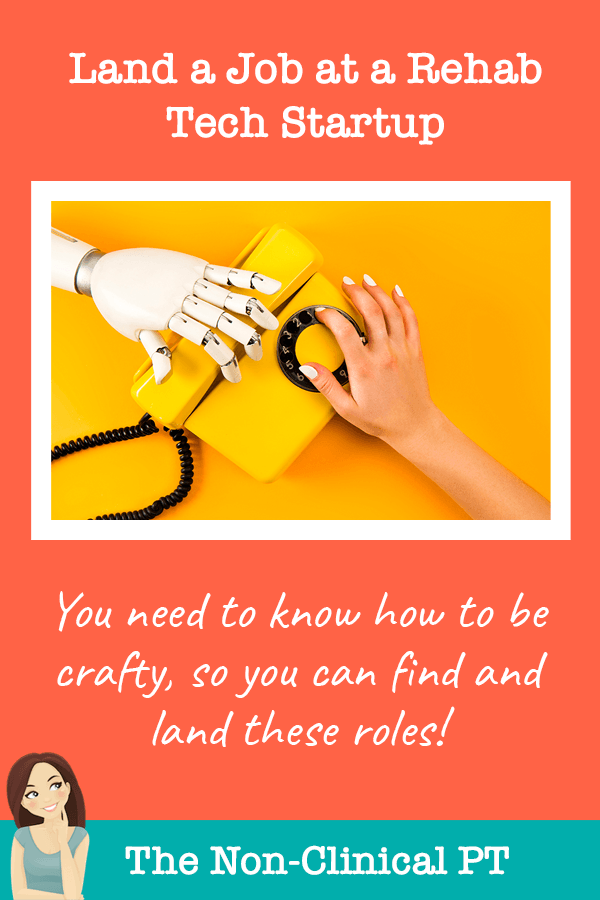I’m an occupational therapist, but I have landed in a place I never thought I’d be: a rehab tech startup! I get lots of questions from other rehab professionals about how to go from clinical practitioner to landing a tech job, so I wrote this article to help provide some insight.
I work at NeuroLutions, a startup developing Brain-Computer Interface (BCI) technology for stroke rehabilitation.

You can read my spotlight here to learn more about how I landed this role!

In this article, I’ll cover the core skills I use in my role as Field Clinical Manager, and then I’ll provide pointers on how to gain said skills and find the right non-clinical rehab technology roles for YOU!
Table of contents
- Typical skills used in rehab tech startup jobs
- How to land a rehab tech startup job
- Final thoughts on rehab tech jobs
This post may contain affiliate links or codes. This won’t increase your cost, but it helps keep TNCPT alive, and free of annoying ads! Thank you for your support. 🙂
Typical skills used in rehab tech startup jobs
If you work for a tech company—particularly a rehab startup—your duties will typically be very cross-functional with other departments of the business. Some of the skills I use the most in my own role as Field Clinical Manager include:
- Research support
- Marketing
- Business strategy
- Sales or market strategy
- Clinical presentation
- Training
- Customer support (clinicians and users)
- Product design
As you can see, I wear quite a few hats in my role!
In order to fill a role like mine, it’s extremely helpful to complement your clinical background with skills that fit the aforementioned list. If there are areas you feel less competent in or familiar with, here are some ways to gain experience on the job.

Research support
NeuroLutions is developing BCI technology for stroke rehab, and a large part of my role involves gathering feedback from sites, clinicians, and patients who are using our developing tech within a research-based clinical setting. Since we’re not currently selling the device on the market, but are in an investigational and learning phase, I am continually operating in feedback-mode.
Clinical managers in technology companies also assist with protocol development, product deployment, and generalization of research to practice.
Here are a few ways for you to start getting experience in research support:
- Assist with a research project at your facility. Even if those research projects are taking place outside of your direct department, see how you might assist with data collection or analysis. It’s a great way to network and get valuable experience in the research world.
- Reach out to a local university. See if they have a need for clinical support in research projects. This helps you build your expertise, beef up your resume, and make valuable connections.
Marketing
Therapists have tons of industry knowledge that is invaluable to tech companies. We understand the target audience (the patients themselves) and their needs, as well as the needs of family members and caregivers.
Perhaps most importantly, we also have a keen understanding of the needs of the clinicians who will be using (and teaching the use of) the rehab technology in question. This knowledge is incredibly useful to the marketing team.
If you’re looking to build your marketing prowess:
- Take an online course on a free site such as Coursera. You can also explore subscription-based services such as Skillshare or Lynda, where you can take unlimited courses for a flat rate.
- Contact the marketing department of your hospital or clinic facility. Offer to help out; chances are, your input on projects could be extremely helpful. Maybe you can provide patient success stories to increase visibility to your department!
Business acumen
Any background in business, entrepreneurship or program development is helpful for a role in industry. Clinical manager roles involve strategy, planning, budgeting, and other business-related skills.
Also, any experience you have with the development and deployment of a new program or business are extremely helpful.
Assess your business acumen and consider roles in your professional or state organizations that may help hone and refine those skills, such as:
- Volunteer as treasurer or work on a special committee of a professional organization or volunteer organization.
- Take a class in a business-related field, such as product management.
Sales and/or market strategy
As therapists, we’re always selling our services. Sometimes we’re working to grow a business, but in other cases, we’re simply trying to get a patient or family member’s buy-in.
If you have limited experience in sales or market strategy, ask yourself if there are ways you can assist your manager or collaborate with other departments to build strategy around “sales” of a new program or service.
Here are some examples:
- Reach out to a field rep. If there’s a piece of rehab technology that you’ve utilized in practice and believe in, reach out to the local rep to see if there’s any feedback you can provide to increase the reach of the company in your area. Consider becoming a consultant or working in a 1099 role to increase your participation with a technology you believe in.
- Step up a bit more with marketing efforts. Ask your manager if there’s an area in which you can assist with marketing. You can try your hand at traditional physician marketing, or you can explore creating a social media presence for your clinic, starting a blog, or launching an email marketing campaign.
Clinical presentation
As a clinical manager of a rehab technology company, you must be comfortable being “on stage,” whether that’s giving a clinical presentation to investors, training clinicians on a new protocol, representing at a trade show, or presenting at a professional conference.
If you haven’t had the opportunity to present professionally, start locally. What experience do you have to share with your fellow clinicians? Is there a research summary that you could devise to update your team on a specific diagnosis or approach?
Here are some ways to up your clinical presentation skills:
- Submit to present at local conferences. Starting at the state level is a great way to increase your familiarity with putting together a poster or presentation abstract and submission prior to reaching out to regional or national conferences to present on a topic of interest.
- Editor’s note: Consider joining a public speaking group like Toastmasters or Speaker Sisterhood. Not only will these organizations help you hone your speaking skills, they look great on a non-clinical resume!
Training/customer support
Training users on the safe use of rehab devices is a huge part of working as a clinician in a rehab tech company. What I mean by “users” is patients, as well as patients’ caregivers—not to mention the therapists who train said patients and caregivers on the use of these devices. While we’re all skilled in training patients to use lower-tech devices, you might need a bit more experience with teaching users to use modern devices. Here are some ways to gain experience.
- Become a trainer or super-user on a piece of rehab technology in your facility. Participate in a “train the trainer program” to increase your familiarity with teaching/training on technology and rehab tools.
- Improve your skills in user experience. You can take courses with Coursera, IDEO, the International Design Foundation, or other online education platforms. Understanding how a person uses the technology can assist in effective training.
- Editor’s note: If you work on a rehab unit and have access to an exoskeleton, work with the existing super-user on your team to get up to speed.
Design
Rehab professionals have a keen eye for how products are designed. We always consider how devices will work with people’s abilities or disabilities. That said, having formalized design training is very helpful for tech roles. Here are some ways to build your design skills in preparation for a role in a rehab startup:
- Explore online platforms to take design courses. Coursera, IDEO, International Design Foundation, and others offer courses and certificates to increase your knowledge of user-centered design principles.
- Assess a current piece of technology in your clinic. Note what could be improved to decrease setup time and improve user experience. Collect your ideas and provide feedback to the manufacturer for future iterations of the product.
How to land a rehab tech startup job
One of the hardest parts of landing a rehab startup job is knowing how to find the opportunities out there. While these types of roles are gradually becoming more popular as rehab tech takes hold, there aren’t nearly as many of these roles as there are clinical ones—so you need to know how to be crafty about finding and landing these roles. Here are a few tips to help you on your journey:
1. Know thy superpowers.
First of all, consider a population that you’re skilled to work with clinically. Your clinical experience is going to be your “superpower” when it comes to your role, so advanced competency is very important.
Hone your clinical skills and consider additional certifications to set yourself apart.
2. Find a piece of rehab tech you love.
I’m sure there’s a piece of rehab technology out there that you really believe in. Chances are, it’s something you’ve already found to be effective in the clinical setting. However, if you’re not sure what’s out there, attend a rehab-specific conference.
Here are a few ideas:
- ACRM (American Congress of Rehabilitation Medicine)
- AOTA (American Occupational Therapy Association)
- APTA (American Physical Therapy Association)
- ASHA (American Speech-Language-Hearing Association)
- Rehab Week
Peruse the vendor fair (or a list of vendors) and learn as much as you can about technologies that are represented.
3. Get to know the companies.
Once you’ve identified these companies and the products they produce, it’s time to really get to know more about the organizations. Do some digging to find out the following (and, again, this is why connecting at conferences can be so helpful) about rehab technology companies that interest you:
- How do they utilize clinicians on their team?
- Are they looking for freelance work, such as content creation, product testers or product champions?
Sharing your information and interest is a great way to start to build relationships.
4. Understand common rehab technology startup roles.
I want to take a moment to let you know that there are some positions that typically already exist. They may be posted as “Clinical Manager” or “Clinical Representative” roles.
Be wary of sales roles that require you to sell products over serving patients. The right company will want to utilize your knowledge and skills to improve the credibility of product to better serve patients and clinicians.
If you get the sense that you’ll be a salesperson first and clinician second, steer clear!
5. Craft your resume/cover letter effectively.
Once you find a company or role that interests you, you’ll need to tell your story of why you’re the best pick via both a well-crafted resume and a stellar cover letter. Make a case for why a company would benefit from the clinical experience and connections you could offer.
A non-clinical resume
Most of us have no idea how to tailor a resume to a specific job. As clinicians, we’ve never really had to. But when you’re going for a non-clinical role, you need to create a non-clinical resume that matches the job description.
Now, if you’re applying informally via networking, it’s slightly less important to have the perfect resume for the role. But if you’re applying online, you simply must tailor your resume to the job at hand if you want the resume to make it through to the hiring manager.
A tailored cover letter
In the company that I first came on board with, NEOFECT, I was the first clinical person on the US team. In my cover letter, I made it clear that I had some very unique offerings as a clinician—ones that were specifically useful to NEOFECT:
- Neurorehabilitation clinical skills
- The ability to give product feedback
- Ideas about how best to reach clinicians and patients
If you’ve spent time developing your skills in the areas we discussed listed above, talk about the experience that you have from other opportunities that lend itself well to the role for which you’re applying. Experience in business, program development, teaching/training, design and research are all important to highlight.
6. Dazzle in your interview.
As you prepare to interview for a role in this brave new world, go in with CONFIDENCE! Consider working with a career coach to increase your comfort describing your VALUE. You know the disease processes, dynamics of healthcare, client and clinician needs unlike anyone else on the team.
- Practice speaking clearly and confidently about what you could bring to the industry.
- Use your clinical track record, development of supportive skills, and exposure to industry as evidence that you’ve done your homework.
Editor’s note: We created Non-Clinical 101 to help you with every step of the process on your non-clinical journey! It’s like a career coach, resume consultant, and cheerleader wrapped into one affordable (and incredibly effective) package!
7. Really, really know (and understand) the company.
As in any role, truly understanding the company is immensely helpful during the interview process. Some things to explore before you have your interview (yes, even the phone interview) include:
- Where are they in terms of funding cycles?
- What is their business model?
- How do they utilize clinicians?
- How do they reach patients or end users?
- What do they do well?
- Where are the gaps in their reach or strategy?
Coming to the interview with understanding (and ideas for improvement, if possible) is a bold move toward demonstrating your value. Recognize that your initial foray in an industry role may be as a consultant or content creator to get a foot in the door.
I started giving feedback about NEOFECT’s Rapael Smart Glove regularly (unsolicited initially), and eventually the CEO and lead software developer paid me a visit to listen to the feedback I had collected.
Final thoughts on rehab tech jobs
If you’re interested in learning more about how you can better harness rehab technology in practice, provide valuable product feedback, grow your skills and connect with companies innovating in the field, networking is key. Non-Clinical 101 also does a deep dive into all sorts of non-clinical roles in the technology space, such as user experience (UX), research, sales, account management, clinical specialist, patient trainer, and more!
You can also connect with professional organizations that have connections to industry such as the American Congress of Rehab Medicine’s Technology Networking group or the International Industry Society in Advanced Rehabilitation Technology.
Industry work is fun, and there is a nice camaraderie between clinicians in the rehab tech space. As therapists, if we don’t get a seat at the table developing the new technologies of the future, it will be developed without us. Get out there!





